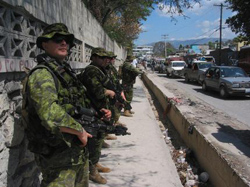The Coup
What happened on February 29, 2004?

A Canadian military helicopter flies over the Presidential Palace in Port-au-Prince after Aristide's ouster.

Canadian forces prepare for a foot patrol in Port-au-Prince.
With paramilitary forces controlling most of Haiti after a month of battles, US and Canadian military forces landed in Port-au-Prince, the nation's capitol.
While Canada's Joint Task Force 2 (JTF2) secured the airstrip and 550 members of the Canadian military were stationed around Port-au-Prince, US diplomat Luis Moreno and several armed US Marines arrived at the presidential palace with an ultimatum for Jean Bertrand Aristide, the elected President of Haiti. According to Aristide, Moreno said that if he did not leave, thousands of Haitians would die, and Aristide would likely be killed by rebels. Aristide signed a letter saying he was leaving in the hope of avoiding a bloodbath, but the letter did not contain an explicit resignation and, in any event, was clearly signed under the threat of violence. Aristide was then accompanied to an aeroplane and flown to the Central African Republic, where he was held at a French military base until he was able to contact US Congresswoman Maxine Waters--on a cell phone that was smuggled--to him to notify the world of his situation.
The groundwork for the coup, however, was laid in Ottawa.
Following the landslide victory of Aristide and his Famni Lavalas party in the 2000 elections, Canada (along with the U.S. and the E.U. at the behest of France) declared the elections flawed on the basis of a technicality and cut off $500 millions dollars in aid to the government while redirecting funding to anti-Aristide NGOs.
At the same time, gangs of former soldiers and death squad members (who were found to be financed and organized by the CIA during the 1991-1994 military regime) were launching frequent attacks and even coup attempts from their base in the Dominican Republic.
Then, in January 2003, Canada hosted the "Ottawa Initiative", a gathering of all the "major players" in Haiti, which did not include representatives from the democratically elected government, and reached a consensus that "Aristide must go".

A Canadian soldier stands guard at the Toussaint Louverture Airport in Port-au-Prince.
As political tensions between the foreign-funded opposition and Lavalas supporters flared in early 2004, former police chief Guy Philippe led an invasion by the paramilitary forces (likely armed by the US) from the Dominican Republic, misleadingly called a "rebellion" or even a "popular uprising" in the Canadian media. The paramilitaries quickly overran key cities and surrounded Port-au-Prince before the Marines and JTF2 completed the coup d'état/kidnapping.
While France, Canada, and many European nations are supporting the de facto government appointed by U.S. officials, many others do not recognize it as legitimate. The Caribbean Community, the African Union, and Venezuela have all refused to recognize the installed government, and South Africa's African National Congress (Nelson Mandela's party) has started a campaign for the return of democracy to Haiti.
The Canadian government has gone to great lengths to legitimate Gerard Latortue's installed regime. Paul Martin and Foreign Affairs Minister Pierre Pettigrew have both made official visits to Haiti since the coup, and Martin appeared with Latortue at a conference for the Haitian Diaspora in Montreal.
